
The Incredible String Band were a British psychedelic folk band formed by Clive Palmer, Robin Williamson and Mike Heron in Edinburgh in 1966. The band built a considerable following, especially in the British counterculture, notably with their albums The 5000 Spirits or the Layers of the Onion (1967), The Hangman's Beautiful Daughter (1968), and Wee Tam and the Big Huge (1968). They became pioneers in psychedelic folk and, through integrating a wide variety of traditional music forms and instruments, in the development of world music.
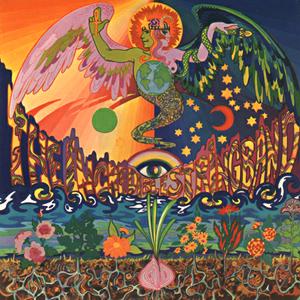
The 5000 Spirits or the Layers of the Onion is the second album by the Scottish psychedelic folk group the Incredible String Band (ISB). It was released in July 1967 on Elektra Records. The album was recorded following the reformation of the band as a duo consisting of Robin Williamson and Mike Heron. Notably, the album was a change in musical direction for the two as they transitioned from their more conventional folk music structures into complex psychedelic compositions influenced by British folk and Indian music.

The Hangman's Beautiful Daughter is the third album by Scottish psychedelic folk group the Incredible String Band (ISB), and was released in March 1968 on Elektra Records. It saw the band continuing its development of the elements of psychedelic folk and enlarging on past themes, a process they had begun on their previous album, The 5000 Spirits or the Layers of the Onion. Instrumentally, it was the ISB's most complex and experimental album to date, featuring a wide array of exotic instruments. In addition, the album captured the band utilising multi-tracks and overdubbing.

The Incredible String Band is the debut album by the band of the same name, released in the United Kingdom in October 1966 by record label Elektra. It is the only one of the band's albums to feature the original trio line-up with Clive Palmer, Robin Williamson and Mike Heron.

Christina "Licorice" McKechnie is a Scottish musician. She was a singer and songwriter in the Incredible String Band between 1968 and 1972. Her whereabouts have been publicly unknown since 1987, when she was last seen hitchhiking across the Arizona desert.

U is a double album, the seventh studio album overall, by the British psychedelic folk group the Incredible String Band (ISB) and was released on Elektra Records in October 1970. The majority of the material featured on the album was taken from the mixed-media production of the same name, which saw the band backed by the dancing troupe the Stone Monkey. The concept of U derived from the ISB's fascination and subsequent conversion to Scientology in 1969.

Wee Tam and the Big Huge is the fourth album by the Scottish psychedelic folk group the Incredible String Band, released in 1968 by Elektra Records as both a double LP and separate single LPs known individually as Wee Tam and The Big Huge.

Changing Horses is the fifth album by the Scottish psychedelic folk group, the Incredible String Band (ISB), and was released in November 1969 on Elektra Records. The album saw the group continuing their use of unique instruments while integrating a standard musical structure. In addition, the album is seen as a transitional period in which the ISB shifted in musical textures, including early utilization of electric-based instruments.
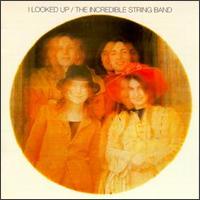
I Looked Up is the sixth album by the Incredible String Band. Recorded at a time when the band was busy rehearsing for their ambitious upcoming stage show, U, the album has been described by band member Robin Williamson as a "quickie" album.
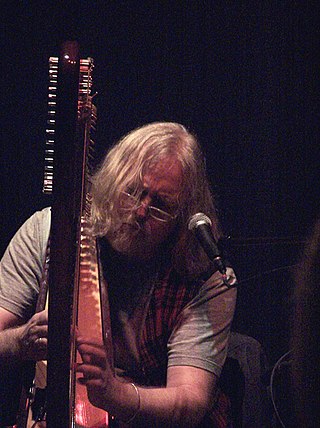
Robin Duncan Harry Williamson is a Scottish multi-instrumentalist, singer, songwriter, and storyteller who was a founding member of The Incredible String Band.
Clive Harold Palmer was an English folk musician and banjoist, best known as a founding member of the Incredible String Band.
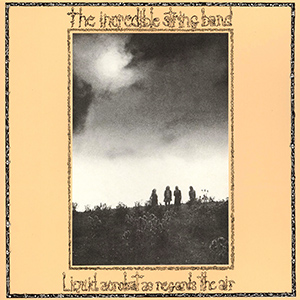
Liquid Acrobat as Regards the Air is the ninth album by the Incredible String Band. It features Mike Heron, Robin Williamson, Licorice McKechnie and Malcolm Le Maistre. The album was the band's first almost entirely electric recording; a new feature that was to define the change in the band's sound throughout their final period through 1974.
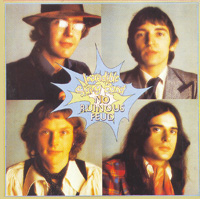
No Ruinous Feud is the eleventh album released by The Incredible String Band in 1973.

Rose Simpson is an English former musician. Between 1968 and 1971, she was a member of the Incredible String Band, with whom she sang and played bass guitar, violin and percussion among other instruments. She later became Lady Mayoress of the Welsh town of Aberystwyth.
Malcolm Le Maistre is an English musician, experimental artist and theatre director, who was a member of the Incredible String Band in the 1970s.

Earthspan is the tenth album by The Incredible String Band, released in 1972 on Island Records. It features Mike Heron, Robin Williamson, Licorice McKechnie, and Malcolm Le Maistre.
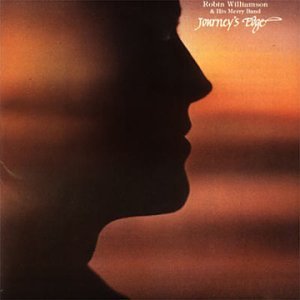
Journey's Edge is the second solo album by Scottish folk artist Robin Williamson and his Merry Band. The work was released in 1977, and re-released in 2008 by Fledg'ling Records with ten bonus tracks.
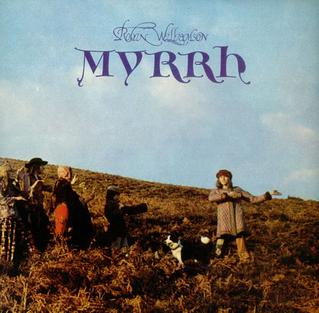
Myrrh is a folk album and the solo debut of Robin Williamson, released in 1972. Robin Williamson is noted as being a founding member of The Incredible String Band. Myrrh was subjected to a low budget and placed on the Island label's lowest sub-label, Help. The album was downgraded by poor-quality sound mixing and a single-sleeve cover design.
"A Very Cellular Song" is a song by the Incredible String Band, written by Mike Heron, released on the 1968 album The Hangman's Beautiful Daughter.
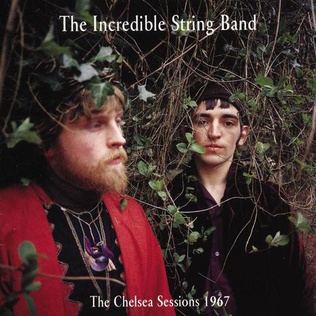
The Chelsea Sessions 1967 is a compilation album by the Scottish psychedelic folk group the Incredible String Band, which compiles their demo recordings prior to their second studio album, The 5000 Spirits or the Layers of the Onion. Other tracks were also produced during the Wee Tam and the Big Huge sessions in 1968. The sessions were first uncovered by Island Records in 1985. The early productions were one of the first known recordings with Mike Heron and Robin Williamson as a duo.

















